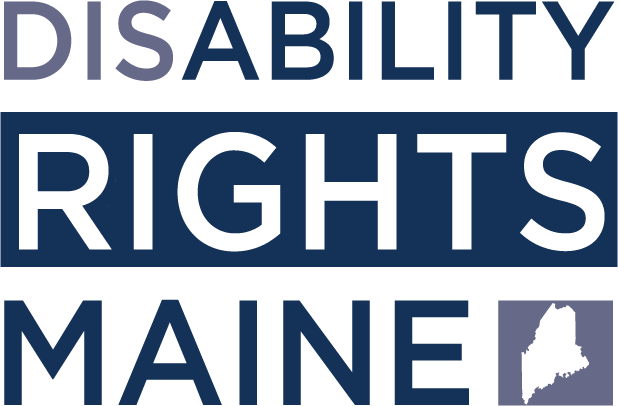Mental Health Advocacy
The Mental Health Advocacy Program at Disability Rights Maine works with individuals experiencing discrimination or violations of their rights.
Disability Rights Maine also has dedicated staff who are based at Maine’s two state psychiatric hospitals: Dorothea Dix Psychiatric Center, located in Bangor, and Riverview Psychiatric Center, located in Augusta. DRM also conducts regular monitoring of Maine’s two private psychiatric hospitals – Spring Harbor Hospital, located in Westbrook and Acadia Hospital, located in Bangor – and psychiatric units in general hospitals.
DRM’s Mental Health Advocacy Program focuses on the following areas, consistent with agency priorities and resources.
Inpatient Psychiatric Settings & Group Homes
Engaging in public education and outreach.
Community Mental Health
Engaging in public education and outreach.
Systemic Initiatives
Press Release: Disability Rights Maine Condemns Executive Order Taking Away Civil Liberties
CONTACT: Julia Endicott 978-877-3871 jendicott@drme.org FOR IMMEDIATE RELEASE July 25, 2025 Disability Rights Maine Condemns Executive Order Taking Away Civil Liberties Augusta –Disability Rights Maine (DRM) is deeply concerned by yesterday’s Executive Order...
Centering Disability During Sexual Assault Awareness Month
This April marks the 24th anniversary of Sexual Assault Awareness Month. Since 2001, the National Sexual Violence Resource Center (NSVRC) has designated April as Sexual Assault Awareness Month to lift up and support survivors of sexual violence across the country....
DRM Statement on the Dismissal of the AMHI Consent Decree
On December 3, 2024 the Maine Superior Court issued an order dismissing the 1989 class action lawsuit and subsequent 1990 injunction that is commonly known as the “AMHI Settlement Agreement or AMHI Consent Decree.” AMHI was a state inpatient psychiatric facility at...
“The Beds Were Just Not Available to Her.” When Psychiatric Hospitals Refuse to Admit Patients from Emergency Departments
In the fall of 2022, Disability Rights Maine (DRM) represented a woman who had been "blue papered"[1] in an emergency department (ED) and was awaiting transfer to a psychiatric bed. She remained in the ED for 65 days until eventually being transferred to a...
MaineCare and the IMD Waiver: Questions & Answers
Q: What is Medicaid? A: Medicaid is a joint federal and state program that provides free or low-cost health coverage to millions of Americans, including some low-income people, families and children, pregnant women, the elderly, and people with disabilities. The...
Hospital-Based Advocates Continue Supporting People with Disabilities During the Pandemic
Disability Rights Maine’s four hospital-based advocates have a unique role among DRM staff. We get to meet with patients of Maine’s largest psychiatric hospitals and find ways to protect their rights as recipients of mental health services. There are DRM offices...
The Law Court’s Decision in A.S. v. LincolnHealth and Its Impact on Maine’s “Blue Paper” Law (34-B M.R.S.A. § 3863)
In January of this year Maine’s highest state court, the Maine Supreme Judicial Court, also known as the “Law Court”, issued a decision called A.S. v. LincolnHealth.[1] This decision had a substantial impact on the process used to hold someone in a general...
DRM Provides Voting Information to Individuals in Hospitals, Ensuring Their Right to Participate in the 2020 Election
Susan B. Anthony once said: “Someone struggled for your right to vote. Use it.” However, sometimes “using it” comes with its own struggles. This is certainly true for individuals with disabilities who are patients in psychiatric hospitals. One of DRM’s core...
DRM Death Investigation Leads to Recommendations for Increased State Oversight of Maine’s Progressive Treatment Program
Disability Rights Maine (DRM) was contacted by the mother and legal guardian of John Doe[1], a 40 year old man who had been found unresponsive in his apartment and was later declared dead. The mother stated that her son was an individual with mental illness and was...
Disability Rights Maine Complaints Lead to First Steps In Stopping the Criminalization of Mental Illness In the Lewiston-Auburn Area
Disability Rights Maine (DRM) is the federally-mandated and State-designated nonprofit agency tasked with protecting and advocating for the rights of individuals with disabilities in the State of Maine. DRM’s primary responsibilities include preventing and...
How Can We Help?
Contact us anytime. DRM wants to hear from you. Whether you’re looking for advocacy, have a question, or just want to connect, please reach out.
